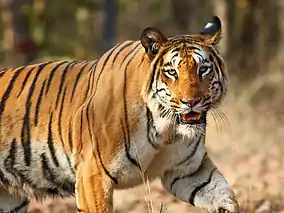Biosphere reserves of India
The Indian government has established 18 biosphere reserves[1] (categories roughly correspondingly to IUCN Category V Protected areas) to protect larger areas of natural habitat than a typical national park or animal sanctuary, and that often include one or more national parks or preserves, along with buffer zones that are open to some economic uses. Protection is granted not only to the flora and fauna of the protected region, but also to the human communities who inhabit these regions, and their ways of life.
| Part of a series on the |
| Wildlife of India |
|---|
 |
World network
Tweleve of the eighteen biosphere reserves are a part of the World Network of Biosphere Reserves, based on the UNESCO Man and the Biosphere (MAB) Programme list.[1][2][3]
| # | Name | States/ UT | Year |
|---|---|---|---|
| 1 | Nilgiri Biosphere Reserve | Tamil Nadu, Kerala and Karnataka | 2000 |
| 2 | Gulf of Mannar Biosphere Reserve | Tamil Nadu | 2001 |
| 3 | Sundarbans Biosphere Reserve | West Bengal | 2001 |
| 4 | Nanda Devi Biosphere Reserve | Uttarakhand | 2004 |
| 5 | Nokrek Biosphere Reserve | Meghalaya | 2009 |
| 6 | Pachmarhi Biosphere Reserve | Madhya Pradesh | 2009 |
| 7 | Simlipal Biosphere Reserve | Odisha | 2009 |
| 8 | Great Nicobar Biosphere Reserve | Andaman & Nicobar Islands | 2013 |
| 9 | Achanakmar-Amarkantak Biosphere Reserve | Chhattisgarh, Madhya Pradesh | 2012[2] |
| 10 | Agasthyamalai Biosphere Reserve | Kerala and Tamil Nadu | 2016[4] |
| 11 | Khangchendzonga National Park | Sikkim | 2018[5] |
| 12 | Panna | Madhya Pradesh | 2020[6] |
List of biosphere reserves in India
Potential sites
The following is a list of potential sites for Biosphere Reserves as selected by Ministry of Forests and Environment:[7]
- Abujmarh, Chhattisgarh
- Andaman and Nicobar, North Islands
- Chintapalli, Visakhapatnam Andhra Pradesh
- Kanha, Madhya Pradesh
- Kovalam, Kerala
- Lakshadweep Islands, Lakshadweep
- Little Rann of Kutch, Gujarat
- Phawngpui (Blue Mountain), Mizoram
- Namdapha, Arunachal Pradesh
- Singhbhum, Jharkhand
- Tawang and West Kameng, Arunachal Pradesh
- Thar Desert, Rajasthan
- Tadoba National Park and Sanjay Gandhi National Park, Maharashtra
References
- "Biosphere Reserves in India" (PDF). Ministry of Environment, Forest and Climate Change. 2019. Retrieved 5 February 2020.
- "20 new Biosphere Reserves added to UNESCO's Man and the Biosphere (MAB) Programme". UNESCO. 11 July 2012. Retrieved 5 February 2020.
- "Man and the Biosphere Programme". UNESCO. Retrieved 5 February 2020.
- "20 sites added to UNESCO's World Network of Biosphere Reserves". UNESCO. 19 March 2016. Retrieved 5 February 2020.
- Mohan, Vishwa (8 August 2018). "Kanchenjunga Biosphere Reserve gets entry into the UNESCO's global list". The Economic Times (India). Retrieved 5 February 2020.
- "MP's Panna Tiger Reserve now a UNESCO Biosphere Reserve". Times of India. 4 November 2020. Retrieved 2 December 2020.
- "Status of Biosphere reserves in India" (PDF). ENVIRO NEWS, Ministry of Environment and Forests. January–March 2008. p. 9. Archived from the original (PDF) on 20 January 2013. Retrieved 1 June 2013.
External links
| Wikimedia Commons has media related to Biosphere reserves of India. |
- Wildlife Institute of India webpage on India's Biosphere Reserves at Archive.today (archived 9 May 2004)
- United Nations List of National Parks and Protected Areas: India (1993) at the Library of Congress Web Archives (archived 25 November 2001)
- Ministry of Environment and Forests